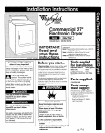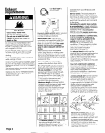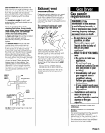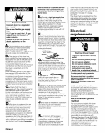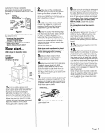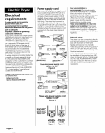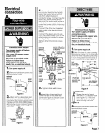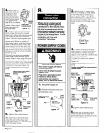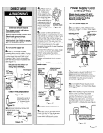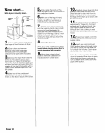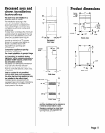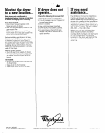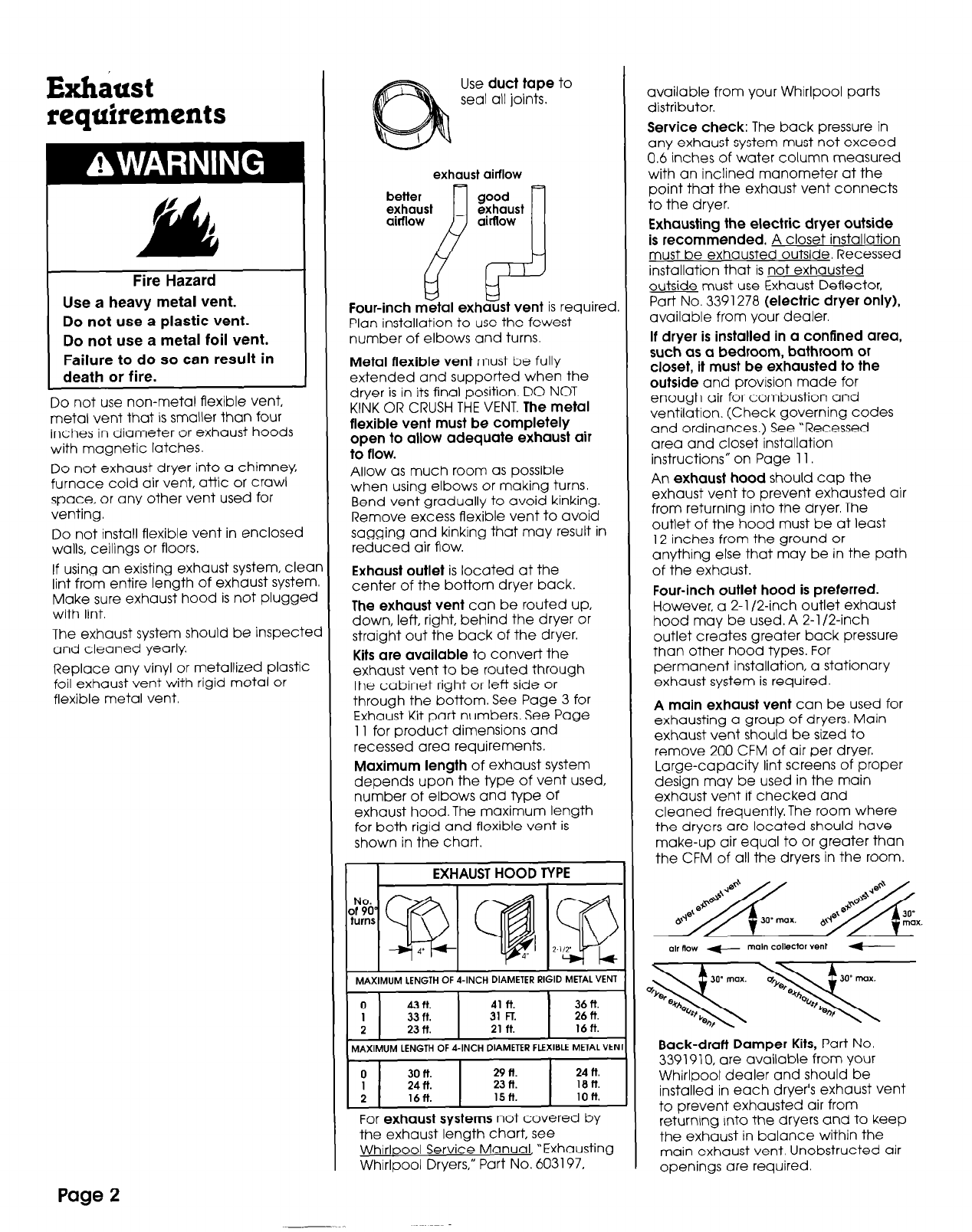
Exhaust
requirements
/
f
Aa
I
Fire Hazard
Use a heavy metal vent.
Do not use a plastic vent.
Do not use a metal foil vent.
Failure to do so can result in
death or fire.
Do not use non-metal flexible vent,
metal vent that is smaller than four
inches in diameter or exhaust hoods
with magnetic latches.
Do not exhaust dryer into a chimney,
furnace cold air vent, al-tic of crawl
space, or any other vent used for
venting.
Do not install flexible vent in enclosed
walls, ceilings or floors.
If using an existing exhaust system, clear
lint from entire length of exhaust system
Make sure exhaust hood is not plugged
with lint.
The exhaust system should be inspectec
and cleaned yearly.
Replace any vinyl or metallized plastic
foil exhaust vent with rigid metal or
flexible metal vent.
Use
duct tape
to
seal all joints.
exhaust airflow
Four-inch
metal exhaust vent is reql
Plan installation to use the fewest
number of elbows and turns.
lired.
Metal flexible vent
must be fully
extended and supported when the
dryer is in its final position. DO NOT
KINK OR CRUSH THE VENT. The metal
flexible vent must be completely
open to allow adequate exhaust air
to flow.
Allow as much room as possible
when using elbows or making turns.
Bend vent gradually to avoid kinking.
Remove excess flexible vent to avoid
sagging and kinking that may result in
reduced air flow.
Exhaust outlet is located at the
center of the bottom dryer back.
The exhaust vent can be routed up,
down, left, right, behind the dryer or
straight out the back of the dryer.
Kits are available to convert the
exhaust vent to be routed through
the cabinet right or left side or
through the bottom. See Page 3 for
Exhaust Kit part numbers. See Page
11 for product dimensions and
recessed area requirements.
Maximum length of exhaust system
depends upon the type of vent used,
number of elbows and type of
exhaust hood. The maximum length
for both rigid and flexible vent is
shown in the chart.
I
EXHAUST HOOD
TYPE
I I
I
I
I
MAXIMUM LENGTH OF 4-INCH DIAMETER RIGID METAL VENT
0
43 n.
41 ft. 36 f-t.
1 33 ft. 31 Fr. 26 ft.
2
ii it.
21 ft.
16 ft.
MAXIMUM LENGTH OF 4-INCH DIAMETER FLEXIBLE METAL VEN
0
30 ft.
29 ft. 24 ft.
1
24 ft.
23 ft.
18 n.
2
16ft.
15
n.
10 n.
For exhaust systems not covered by
the exhaust length chart, see
Whirloool Service Manual, “Exhausting
Whirlpool Dryers,” Part No. 603197,
available from your Whirlpool parts
distributor.
Service check: The back pressure in
any exhaust system must not exceed
0.6 inches of water column measured
with an inclined manometer at the
point that the exhaust vent connects
to the dryer.
Exhausting the electric dryer outside
is recommended. A closet installation
must be exhausted outside. Recessed
installation that is not exhausted
outside must use Exhaust Deflector,
Part No. 3391278 (electric dryer only),
available from your dealer.
If dryer is installed in a confined area,
such as a bedroom, bathroom or
closet, it must be exhausted to the
outside and provision made for
enough air for combustion and
ventilation. (Check governing codes
and ordinances.) See “Recessed
area and closet installation
instructions” on Page 11.
An exhaust hood should cap the
exhaust vent to prevent exhausted air
from returning into the dryer. The
outlet of the hood must be at least
12 inches from the ground or
anything else that may be in the path
of the exhaust.
Four-inch outlet hood is preferred.
However, a 2-l/2-inch outlet exhaust
hood may be used. A 2-l/2-inch
outlet creates greater back pressure
than other hood types. For
permanent installation, a stationary
exhaust system is required.
A main exhaust vent can be used for
exhausting a group of dryers. Main
exhaust vent should be sized to
remove 200 CFM of air per dryer.
Large-capacity lint screens of proper
design may be used in the main
exhaust vent if checked and
cleaned frequently. The room where
the dryers are located should have
make-up air equal to or greater than
the CFM of all the dryers in the room.
Back-draft Damper Kits, Part No.
3391910, are available from your
Whirlpool dealer and should be
installed in each dryer’s exhaust vent
to prevent exhausted air from
returning into the dryers and to keep
the exhaust in balance within the
main exhaust vent. Unobstructed air
openings are required.
Page 2



